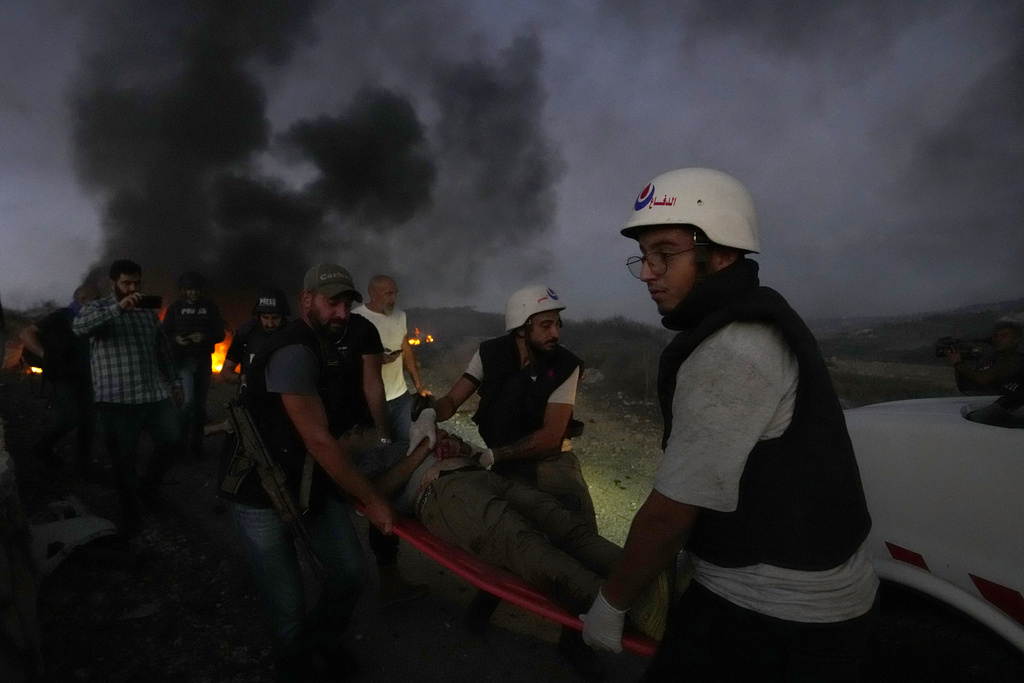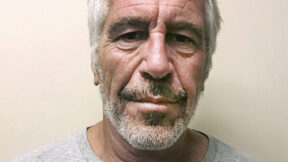Committee to Protect Journalists Demands Biden Take Action on ‘Shocking’ Killings of Reporters in Gaza

Civil Defense workers and a Lebanese security officer carry a journalist who was injured by Israeli shelling, at Alma al-Shaab border village with Israel, south Lebanon, Friday, Oct. 13, 2023. AP Photo/Hassan Ammar.
The Committee to Protect Journalists (CPJ) sent President Joe Biden and his national security team a strongly worded letter Wednesday demanding the United States do more to protect journalists covering the Israel-Hamas conflict.
The letter from the American non-profit organization, which was obtained by Mediaite, begins by calling out the very high death toll so far among journalists covering the conflict and concludes with a list of five specific action items the Biden administration could take to enhance both journalists’ safety and their ability to report on the conflict.
CPJ was founded in 1981 to defend the rights of journalists across the world. Its founding honorary chairman was Walter Cronkite.
“At least 79 journalists and media workers have been killed in Israel, Gaza, and Lebanon amid hostilities between Israeli forces and Palestinian and Lebanese armed groups since October 7, when Hamas-led fighters carried out horrific attacks and hostage-taking in Israel,” the letter begins, adding:
The killing of so many journalists in so brief a period of time is shocking and horrific. It has obvious and profound implications for the ability of the public, including the American public, to be informed about a conflict with local, regional, and global implications. We are writing to entreat you to act immediately and decisively to promote the conditions for safe and unrestricted reporting on the hostilities.
The CPJ puts the death toll in context, arguing that “more journalists have been killed in the first 10 weeks of the hostilities than have ever been killed in a single country over an entire year.” The Hamas-linked Health Ministry in the Gaza Strip now puts the death toll in Gaza over 23,000 since the beginning of hostilities in October.
The letter then goes on to argue that some of the IDF’s attacks on journalists operating in the region were “deliberate”:
The U.S. State Department spokesperson recently said that the United States has not seen any evidence that Israel is intentionally targeting journalists. Yet credible reports by human rights and media organizations indicate that the IDF strikes in southern Lebanon on October 13 that killed Reuters journalist Issam Abdallah and injured six other journalists from Reuters, Al Jazeera, and Agence France-Presse were unlawful and apparently deliberate.
“Of course, the targeted or indiscriminate killing of journalists, if committed deliberately or recklessly, is a war crime, and the International Criminal Court has said that it will investigate reports of war crimes committed against journalists in Gaza,” the CPJ concluded. The CPJ has previously called for investigations into the specific incidents of alleged targeting of journalists killed by IDF bombings.
The letter goes on to lay out the difficulties journalists face in reporting on the conflict, particularly from inside Gaza. “These challenges include the refusal of Israel and Egypt to allow international journalists access to Gaza except under Israeli military escort (and even then, with restrictions on reporting), internet shutdowns that prevent news and testimonies from Gaza from reaching the outside world, arbitrary detention, and harassment and intimidation,” the letter argues adding:
In addition, the Israeli government is requiring media outlets in Israel to submit almost any detailed reporting on the war to its “Censorship” office for review, while banning reporting on significant topics of public interest related to the war in Gaza. It has also acted against its domestic press, for example, by threatening to retaliate against the country’s oldest newspaper, Haaretz, for its coverage of the war, and threatening to shut down local bureau offices of foreign news agencies.
The CPJ ends the letter by urging Biden to “act immediately and decisively” and lists specific action items it would like to see:
Publicly call on all parties to the armed conflict to: respect the right of journalists to report on the hostilities, ensure journalists’ safety, allow all journalists seeking to evacuate from Gaza to do so, abjure the indiscriminate and deliberate killing of journalists, promptly and thoroughly investigate all attacks on journalists, and hold accountable individuals found to be responsible for them.
Demand that Israel and Egypt provide international journalists with access to Gaza, and that Israel cease communication blackouts and take whatever steps are necessary to assure the safety of journalists admitted to Gaza as well as those already working there.
Conduct thorough, transparent, and public assessments of the end-use of U.S. weapons and military assistance to Israel in the course of the hostilities to ensure/evaluate compliance with U.S. law or regulations, international law, and civilian protection responsibilities.
Demand that Israel allow the passage of personal protective equipment and materials used for newsgathering, such as helmets, flak jackets, phone chargers, eSIM cards, and laptops, to reporters in Gaza and the West Bank.
Support swift, transparent, and independent investigations into the killing of all journalists and ending the longstanding pattern of impunity in the killings of journalists by the IDF, including Palestinian-American Shireen Abu Akleh.
The letter states that given the United States’s strong support for Israel, the country “will be judged on how it has used that influence to ensure that all parties to the conflict abide by international law.”





Comments
↓ Scroll down for comments ↓